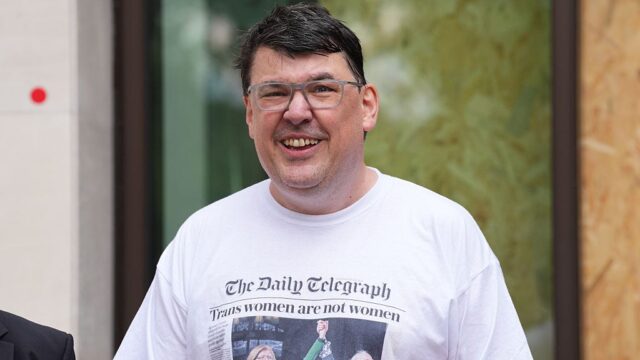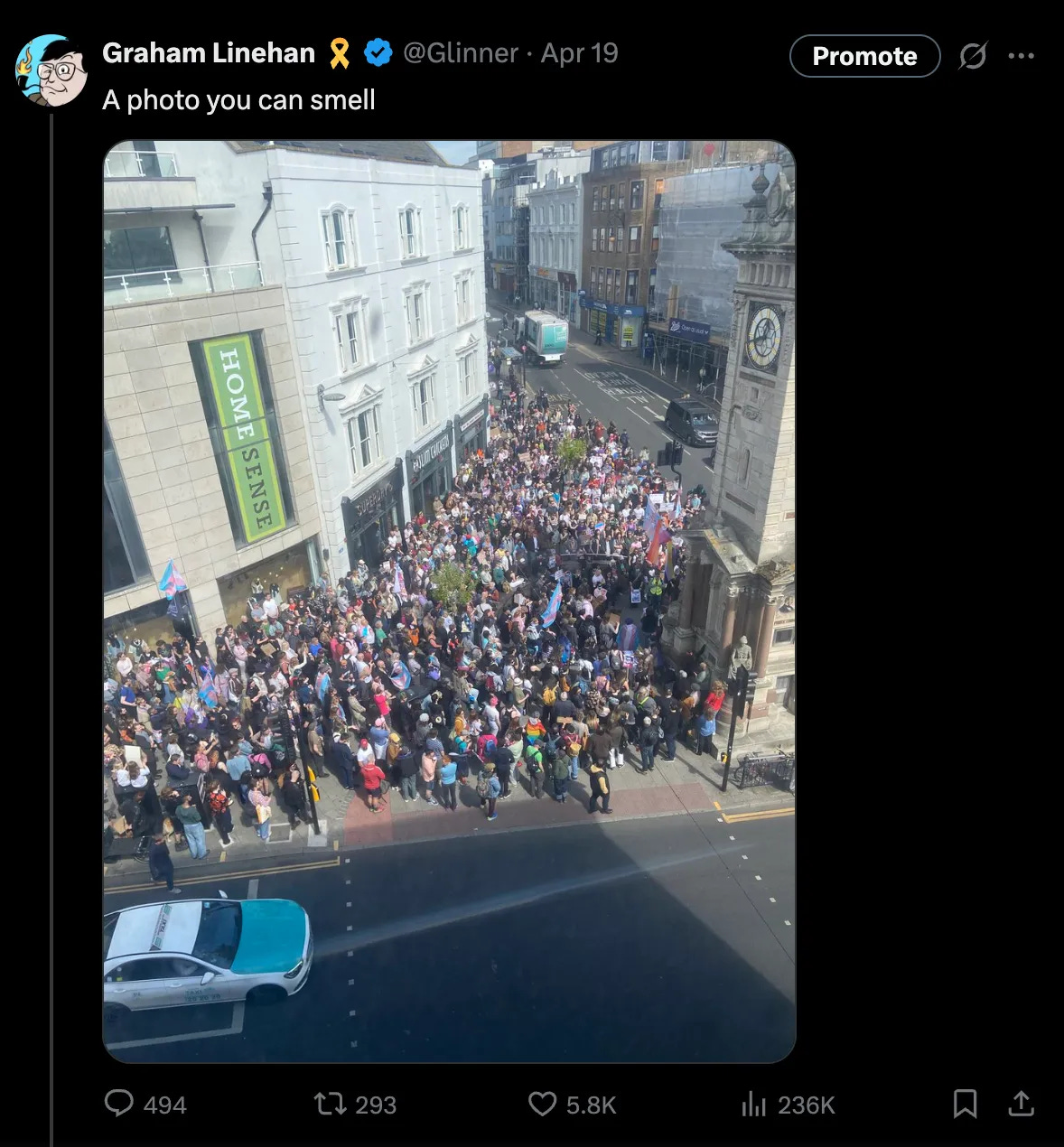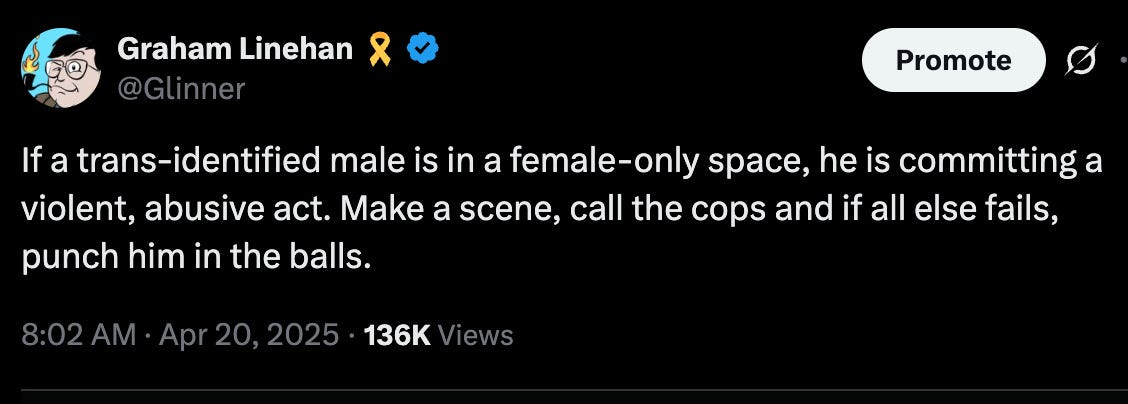The UK Earns Status as a Censorship State

The arrest of Graham Linehan for his tweets is one of many examples that show the country should not be treated as a free one.
Comedian Graham Linehan, best known as the creator or co-creator of The IT Crowd and Father Ted, announced in December that he was leaving London and moving to Arizona.
One of the reasons I’m leaving is because freedom of speech in the UK is really in bad shape at the moment, and I certainly know I would not be able to get anything on television in the UK. Not only that, but with police coming to people’s houses with tweets…I think that the U.S. is a good place at the moment. It seems to be somewhere that values freedom of speech, whereas the UK gave up on that a few years ago very sadly, and the results I’m afraid are around for us all to see.”
Linehan is now proof of that. He was arrested Monday at London’s Heathrow Airport on suspicion of inciting violence for social media posts that were critical of transgender activists. Linehan says police told him that these April posts on X are why they were waiting for him at the airport:



Linehan is already scheduled go to trial Thursday on a harassment charge related to other social media posts he made last October. He wrote about Monday’s arrest and the followup interrogation on his Substack, The Glinner Update:
The officer conducting it asked about each of the terrible tweets in turn, with the sort of earnest intensity usually reserved for discussing something serious like… oh, I dunno—crime? I explained that the ‘punch’ tweet was a serious point made with a joke. Men who enter women’s spaces ARE abusers and they need to be challenged every time. The ‘punch in the bollocks’ bit was about the height difference between men and women, the bollocks being closer to punch level for a woman defending her rights and certainly not a call to violence. (Not one of my best as one of the female officers said “We’re not THAT small”).
He mentioned “trans people”. I asked him what he meant by the phrase. “People who feel their gender is different than what was assigned at birth.” I said “Assigned at birth? Our sex isn’t assigned.” He called it semantics, I told him he was using activist language.
He was released on bail on condition that he not go on X. I assume he had someone else send him screenshots of the above tweets he posted on his Substack.
I have never been to the UK, so I’ve resisted saying what evidence clearly shows: We need to stop pretending that the UK is a free, liberal democracy.
It’s not just this incident. Consider what the director of public prosecutions for England and Wales said in August 2024.
The offense of incitement to racial hatred involves publishing or distributing material, which is insulting or abusive, which is intended to or likely to start racial hatred. So if you retweet that, then you’re republishing that and then potentially you are committing that offense. And we do have dedicated police officers who are scouring social media. Their job is to look for this material and then follow up with identification arrests and so forth. So it’s a really, really serious, people might think they’re not doing anything harmful. They are, and the consequences will be visited upon them.
Does that sound like a free country, where police are “scouring social media” to look for speech offenses, including retweets?
There’s been huge public outcry in response to Linehan’s arrest.

A press officer for London’s Metropolitan Police told me Tuesday afternoon that she couldn’t provide any information about the case, including the law Linehan is accused of breaking, because “we have been in the middle of operational logistics” regarding it. Weird. I had no idea what that meant.
This morning, I got an answer in a statement from Met Commissioner Sir Mark Rowley. He defended his officers, but is clearly tired of constantly enforcing the UK’s censorship laws.
He said there were “reasonable grounds” to arrest Linehan under the country’s Public Order Act, “which dictates that a threat to punch someone from a protected group could be an offence – I understand the concern caused by such incidents given differing perspectives on the balance between free speech and the risks of inciting violence in the real world.”
Rowley says officers are in an “impossible position” given the UK’s laws, and makes clear he wants officers to deal with things more important things than “policing toxic culture wars debates.”
Most reasonable people would agree that genuine threats of physical violence against an identified person or group should be acted upon by officers. Such actions can and do have serious and violent real-world implications.
But when it comes to lesser cases, where there is ambiguity in terms of intent and harm, policing has been left between a rock and a hard place by successive governments who have given officers no choice but to record such incidents as crimes when they’re reported. Then they are obliged to follow all lines of enquiry and take action as appropriate.
I don’t believe we should be policing toxic culture wars debates and officers are currently in an impossible position. I have offered to provide suggestions to the Home Office on where the law and policy should be clarified. Greater clarity and common sense would enable us to limit the resources we dedicate to tackling online statements to those cases creating real threats in the real world. If agreed, we could be ready to test new approaches quickly, within a matter of weeks.
As an immediate way of protecting our officers from the situation we find ourselves in today, we will be putting in place a more stringent triaging process to make sure only the most serious cases are taken forward in future – where there is a clear risk of harm or disorder.
But officers across the country will have to make similar decisions in future unless the law and guidance is changed or clarified. I hope to see this happen without delay so policing’s focus can be squarely on tackling priority issues like street crime and serious violence.
Indeed, the Met is busy enforcing censorship. It arrested 1,709 people for social media posts in 2023. Nationwide, 37 police departments arrested 12,183 people for their posts — an average of 33 people a day.
Police have several laws to choose from. There’s the UK’s Communications Act passed in 2003, which says:

Another law from 1988 has similar language.
Thanks to Brexit, the UK is not part of Europe’s censorship Holy Grail, the Digital Services Act. However, it does have the 2023 Online Safety Act, which is close to full implementation. The law makes it illegal “to cause non-trivial psychological or physical harm to a likely audience.”
Rowley’s statement offers hope that maybe some sanity is forthcoming. It sounds like he wants that to be the case. Will the censorship activists listen?
https://www.racket.news/p/the-uk-earns-status-as-a-censorship
